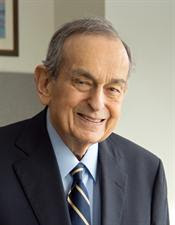STAFF REPORTS

Arthur J. Moss, M.D., the Bradford C. Berk, M.D., Ph.D. Distinguished Professor in the Department of Medicine at the University of Rochester Medical Center, received the Heart Rhythm Society’s Pioneer in Cardiac Pacing and EP Award today at the Society’s 38th Annual Scientific Sessions.
Moss is an internationally recognized expert and uncontested pioneer in the field of electrophysiology (EP). He has dedicated his career to understanding and treating electrical disturbances of the heart and has made some of the most significant discoveries in the treatment and prevention of cardiac arrhythmias, sudden cardiac death, heart failure, and Long QT syndrome (LQTS), a rare, inherited disorder that makes the heart particularly susceptible to arrhythmias.
“I know of no other physician or scientist who has had a greater impact on the field of pacing and electrophysiology; he is incredibly deserving of this award,” said Frank I. Marcus, M.D., professor emeritus of Medicine at the University of Arizona, College of Medicine, who nominated Moss for the honor.
Moss initiated the first major clinical trial testing the implantable cardioverter defibrillator (ICD), a device that detects potentially fatal arrhythmias and shocks the heart back into a normal rhythm. Through the MADIT (Multicenter Automatic Defibrillator Implantation Trial) series of trials, Moss demonstrated that preventive therapy with an ICD significantly reduces the risk of death in heart attack survivors. The finding changed medical guidelines nationwide and led to the use of ICDs in hundreds of thousands of patients each year.
Moss recently launched the sixth MADIT trial with Valentina Kutyifa, M.D., Ph.D., research assistant professor of Cardiology at URMC. The study will determine if a subcutaneous implantable cardiac defibrillator (S-ICD) increases survival in individuals with diabetes, who have a high incidence of heart problems and sudden cardiac death.
Thousands of individuals around the world have benefited from Moss’ research on LQTS, which has transformed the diagnosis, treatment and quality of life of patients with this potentially fatal disorder. Moss devised the first treatment for the condition, a surgical procedure known as a left-sided cervicothoracic sympathetic ganglionectomy. In 1974 he established the International Long QT Syndrome Registry, which includes more than 1,000 LQTS families from around the world and more than 2,500 affected family members. The information in the registry is used by hundreds of scientists and physicians and has led to knowledge of risk factors that enable early diagnosis; the discovery of multiple treatment options that decrease the risk of sudden cardiac death; and the identification of sixteen genes (and counting) associated with the disorder.
“Dr. Moss is both an innovative scientist and a remarkable leader. Few cardiologists, if any, have had more impact on the care of such a large group of high-risk patients,” noted David S. Cannom, M.D., medical director of Cardiology, Hospital of the Good Samaritan, clinical professor of Medicine, UCLA School of Medicine, electrophysiologist, Cedars Sinai Medical Center, who supported Moss’ nomination.
Founder of the Heart Research Follow-Up Program at URMC, Moss has published close to 700 articles in peer reviewed journals over the course of his career.
This is the second major award Moss has received from the Heart Rhythm Society: in 2011, he received the organization’s Distinguished Scientist Award.
Originally published on https://urmc.rochester.edu/news/story.aspx?id=4780

